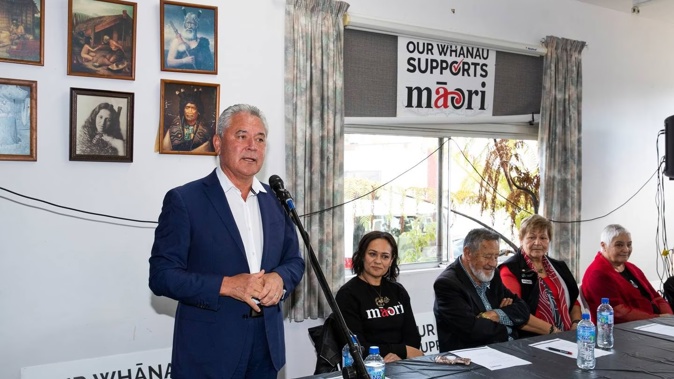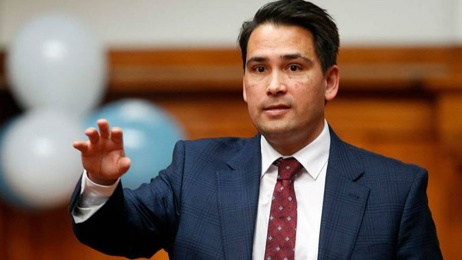
Te Pāti Māori president John Tamihere says young non-Māori voters will jump on to the Māori waka, not by protest but to support equality and equity for Māori.
With Te Pāti Māori riding as the likely October election king maker, Tamihere says the party can take some comfort that they are polling well in polls “not of Māori making”.
He says the changes to the electoral options - where voters who have whakapapa can jump off the general role to the Māori electoral option will eventually see more “young non-Māori become fellow travellers.
“The point is we are building an inter-generational movement, not based on protest but seeking equality and equity,” Tamihere told the Herald.
“That movement is based on the under-40s.
/cloudfront-ap-southeast-2.images.arcpublishing.com/nzme/RH7ZNOGOGFBO7LWJTKQT4NHV5E.jpg)
Chris Hipkins speaking at Hoani Waititi under a large photo of Maori Party co-leader Rawiri Waititi. Photo / Audrey Young
“It’ll take time to build out given electoral law reforms just enacted that allows us to reawaken our Māori value proposition. In addition young non Maori are now fellow travellers.”
By fellow travellers, Tamihere means a person not part of Te Pāti Māori but part of the Māori movement, who supports equity and equality for Māori and will vote for that change.
Māori on the general role have until July 13 to switch to the Māori role for this October’s election.
Te Pāti Māori co-leader Debbie Ngarewa-Packer says the latest law change at least allows the opportunity to switch. Previously, Māori could only opt out of the general to the Māori roll during the five to six-year Māori Electoral Option period.
Ngarewa-Packer says that legislation was racist and a deliberate way of stopping tangata whenua from being able to make decisions about their whenua and whānau.
“This was not accidental, it was a deliberate way of oppressing Māori and that racist legislation now being removed, means that for the very first time we have an opportunity to truly have an unapologetic, stronger, more MP’s, more people, more Māori in Parliament,” Ngarewa-Packer says.
Meanwhile, Tamihere said Te Pāti Māori would consider standing candidates in non-Maori electoral seats.
“We’re a movement and it’s our time,” he said.
“We get to determine who the prime minister is going to be and that’s a big thing.”
Tamihere said the party has come a long way in three short years and Te Pāti Māori were were the only political party to stand against the 2020 “Labour landslide” by winning Waiariki and making big inroads into Tamaki Makaurau and Te Tai Hauāuru - which on Labour Polling could both go to Te Pāti Māori in October.
“We needed to make that gamble a certain thing. “We took one of their safe seats, we made another two seats marginal – and we brought into question the other four,” Tamihere said.
He said the last two poll results showed a trend and were Pakeha polls.
“They’re not a poll of Māori sentiment in Māori seats.”
He said there were three seats for the taking - Waiariki and Te Tai Hauāuru with Tamaki Makaurau the third - and the other four on the swing with the possibility of using the party vote to get even more people in parliament.
“I’ll put my house on it that we’ll win Waiariki and Te Tai Hauāuru.”
Waiariki is currently held by Tamihere’s son-in-law Rawiri Waititi.
Tamihere said running candidates in general seats that have high Māori concentrations on the general roll will help the party.
“Seats like Rotorua, seats like East Coast, seats like Mangere, Manurewa – have higher than usual numbers of Māori located on Pakeha seats.”
Tamihere said with the maturing of Te Pāti Māori, it has come to understand “our space and our place.
“We’ve got a different style of campaigning that other parties won’t even consider. We’re looking forward to it, it’s going to be a great ‘hit-out’.”
Additional reporting by Tamara Poi-Ngawhika, BusinessDesk.
Take your Radio, Podcasts and Music with you









